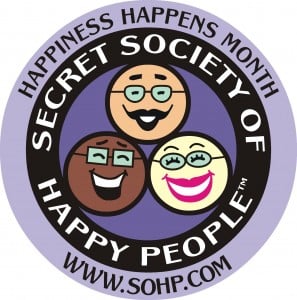When anyone finds out that I’m the founder of the Secret Society of Happy People, inevitably, I get one of two responses. The optimist can’t help but grin and often says, “How do I join?” The pessimist can’t help but get that frozen look on their face that poses the question, “Are you one of those people?” Those people refers to persistently perky over-the-top Pollyanna’s that want to host a storm cellar party when a tornado is about to hit.
 Obviously, on most days, most of the time, I’m optimistic. However, I’m also a realist. If there’s a tornado coming, I don’t need a storm cellar party. If my heart gets broke, I cry. If there’s chaos at work, I want to vent. But once those moments of fear, sadness, or frustration pass, then I want to ask the more important question, “Can I learn from this?” That way my focus isn’t on the unwanted experience. Instead it’s on how I can make an undesirable situation manageable, better or less painful.
Obviously, on most days, most of the time, I’m optimistic. However, I’m also a realist. If there’s a tornado coming, I don’t need a storm cellar party. If my heart gets broke, I cry. If there’s chaos at work, I want to vent. But once those moments of fear, sadness, or frustration pass, then I want to ask the more important question, “Can I learn from this?” That way my focus isn’t on the unwanted experience. Instead it’s on how I can make an undesirable situation manageable, better or less painful.
When someone pretends to be over-the-top happy it can be annoying, especially if we know they aren’t that perky naturally. When someone’s truly happy, over-the-top or not, even a pessimist usually grins a little being around them even if they do it in secret.
Sometimes an over-zealous happy person will try to cheer someone up who doesn’t want to be cheered up. This can be annoying to them. Sometimes everyone needs time for reflection, introspection or to simply ponder something in their cave. And yes, I’ve been an annoying cheerleader. However, the wiser I get, the more I respect that everyone has to find their own happy equilibrium when they are ready.
However, if you’re happy most of the time, it’s equally annoying when people think just because you’re happy that you’re a delusional flake. Mostly happy people have an ability to find the silver living in dark clouds. This is a natural gift for some people and a learned skill for others. But however you do it, it’s not fair to have your optimism and happiness minimized. And that’s why I founded the Secret Society of Happy People in 1998.
When the Society began our world was a little – or a lot – different depending on your perspective. Unemployment was low, homeownership was an investment, politicians governed, and the future looked bright. With our extra time we focused on self-help. An industry from books, to talk shows, to workshops, to 12-step groups, to table conversations flourished. It helped us focused on why we weren’t happy and how to fix it. Despite the obvious positives of the decade, it was chic to be unhappy about something.
One weekend, while working on a humor essay for a personal empowerment newsletter, another 1990’s buzz word, I wondered, “Where are all the happy people?”
Since I’m on the creative side, my imagination flashed to a scene of people standing around talking about what made them happy. They didn’t use their real names and even kept their identities a secret by wearing Mardi Gras masks. Why? Parade-rainers, people who dislike happy people, might crash their gathering. Then I saw the banner – The Secret Society of Happy People.
That daydream made me laugh. I even wondered if these meetings happened anywhere except in my imagination.
That was in April 1997, and by August 1998, other not-so-secretly happy people convinced me to found the Secret Society of Happy People. The purpose of the Society, then and now, is simple:
- Recognize your happy moments with the same enthusiasm as you recognize your unhappy moments.
- Encourage others to talk about their happy moments.
- Don’t unnecessarily rain on other people’s parades.
We don’t have those colorful, theatrical, Mardi Gras masked meetings, but we do have thousands of members from all over the world who all value and celebrate happiness in their own unique way.
We try to increase happy conversations because we believe that happiness is contagious – and now science even proves it. Therefore the more people who talk about happiness, the happier our world will be.
The most significant thing the Society did to increase our happy conversations was to identify the 31 Types of Happiness to expand our happiness vocabulary. When you think of your happiness in broader terms, other than simply I’m happy or I’m unhappy, then it’s easier to recognize more happiness. The more types of happiness you recognize, the happier you’ll feel. The happier you feel, the happier most people around you will feel too.
The Society likes to have a little fun too. When it’s appropriate, we call out parade-rainers. Our most notorious call out was when the late advice columnist Ann Landers told people not to send happy holiday newsletters in their holiday greeting cards in her November 29, 1998 column. We also celebrate Happiness Happens Day on August 8, and August is Happiness Happens Month. We even requested proclamations from the governors of all 50 states and our responses were amusing. We host Hunt for Happiness Week the 3rd week of January. We announce the Happiest Events and Moments of the Year and even voted on the Happiest Events and Moments of the Century in 1999.
As complicated as happiness is, and as easy as it is to focus on what’s wrong, happiness happens in the middle of personal or global unhappiness. People meet and fall in love, have babies, make new friends, help others, spend time with people they like and love, buy homes, get new jobs or start businesses, take vacations, celebrate holidays and milestones, learn new things and count the stars.
While being happy in and of itself won’t solve all of your problems, it can make problem solving easier and possibly even a little more fun. Although happiness and unhappiness share a stage, only one can have a speaking part at a time. We don’t have to be an over-the-top Pollyanna to recognize happiness. We just have to want to be happy most of the time and we can do this when we recognize happiness happens.
Learn more about Secret Society of Happy People Founder — Pamela Johnson!
